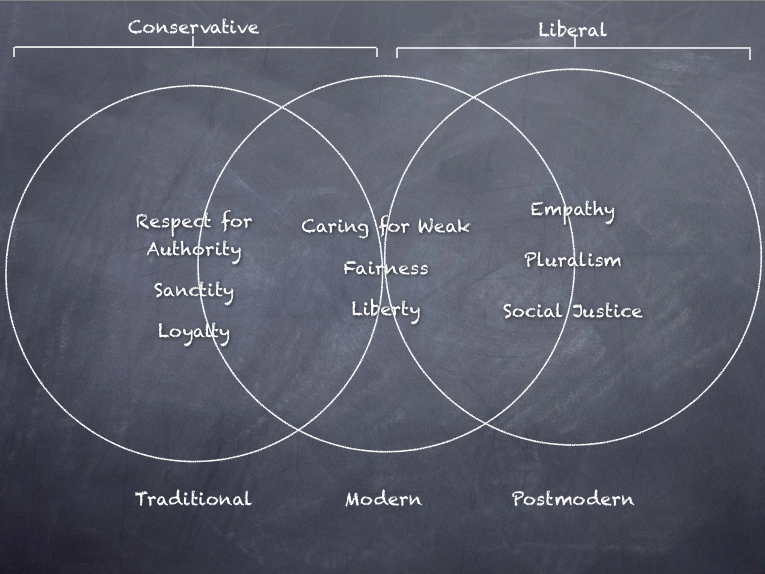Here’s an interesting column from the New York Times op-ed page by Nicholas Kristof. It brings tantalizing integral language to the ongoing political and cultural food-fight between conservatives and liberals. He reports on research that supports a key integral insight: that the two groups not only think different things — but they think different-ly.
He cites research from the upper right quadrant (basic brain and nervous system programming): for instance, that conservatives have a greater startle reflex, and “secrete more skin moisture when they see disgusting images, such as people eating worms.”
But the column focuses on new research around moral values (the upper left quadrant representing individual values; the lower left quadrant representing cultural values). As he reports, “Americans think about values in six languages.” They are:
- Respect for authority
- Sanctity
- Loyalty
- Caring for the weak
- Fairness
- Liberty
Conservatives specialize in one, two and three; liberals specialize in four, five and six, and as Kristof disarmingly admits, “some (me included) mostly use just one, care for victims.”
The research also reveals that unlike liberals, who are bewildered by conservative values one, two and three, conservatives themselves relate to all six values. I can understand the liberal aversion to the first three values; I detect in my own liberal bones a reflexive aversion to authority (“question authority!” was one of the battle cries of the emerging green altitude in the 60’s). Sanctity is, well, quaint to weird. Loyalty is okay, but I’m a little suspicious of it, and worry that it may be blind or clannish.
I know that part of my personal project as a liberal-growing-into-an-integralist is to refriend these first three values in a larger, wiser way.
But I resist any conclusion that these results mean liberals are less inclusive in their thinking. From a developmental perspective we see that all these values are interpreted differently at each level of cultural development. But still, we can also see that they have a home turf where they first take root.
With that understanding we can see that the first three values Kristof cites, respect for authority, sanctity and loyalty are very traditional values; this is home turf for conservatives.
Number four, caring for the weak, can also be part of a traditional mindset, provided the weak are in my group (charitable giving is higher among conservatives than liberals mainly due to church and faith-based giving). However, care for the weak only gets its full, universal expression in post-modernity (the liberal meme), where the moral project becomes the inclusion of all marginalized, victimized people (including the sinners rejected by the traditional meme)
Number six, liberty, gets its biggest boost in modernity (the orange altitude) where the “rights of man” become seen as universal principles. But both conservatives and liberals can relate to liberty: conservatives emphasize liberty from government, but not from religious precepts and cultural mores; for liberals it is the opposite.
So Kristof’s column sparks a welcome and helpful discussion. But like so much of the New York Times op-ed page, it would benefit from a more integral understanding.
As I said, I fear Kristof is drawing a wrong conclusion that conservatives speak more moral languages than liberals. Among the six values he cites this may be true. But what is missing are whole languages of liberal, post-modernist morality that are simply not part of the research he cites.
The moral languages that liberals speak and conservatives don’t we might see as values seven, eight and nine:
7. Empathy
8. Pluralism
9. Social justice
Developmentally, these values arise from the emergence of an ever-deepening world-centric view; one that seeks to create a better world for all people, as opposed to a nation-centric view that seeks to create a better position for one’s own people in the world.
From these world-centric values arises a set of moral imperatives: to rescue victims of oppression, even those oppressed by my own country; to rise up against racism, sexism and homophobia; to seek to right the ecological damage of an unbridled economic growth model, and to fight for the earth as a moral cause.
Liberals have huge (if occasionally distorted) antennae for these things, while conservatives … not much signal coming through.
So, yes, conservatives baffle liberals, as Kristof’s column shows, but let’s not forget that, indeed, liberals baffle conservatives. And the beat goes on.
As integralists, we want to be fundamentally friendly to both views, and subject to neither. We want to see the pieces of truth that each view brings to a wider, more radically inclusive, integrated and living Whole.






